#Jean-Napoléon Michel
Text

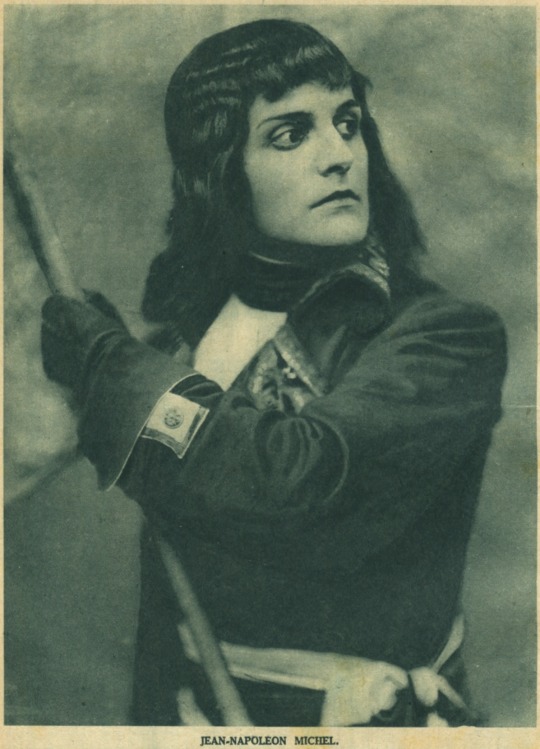
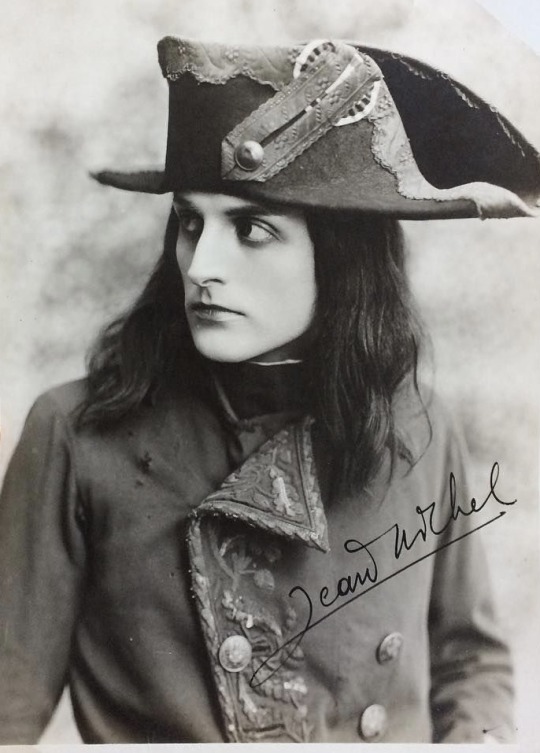
Jean-Napoléon Michel as Napoleon Bonaparte
84 notes
·
View notes
Text
(A while ago @apurpledust mentioned wanting to know more about Duroc's children, so here's what information I have)
Duroc and his wife, Maria de las Nieves Martínez de Hervas, had two children, both of whom died tragically young. (Hervas left instructions that her gravestone should be engraved with "To the unhappiest of mothers".)
Their first child, Napoléon Louis Sidoine Joseph Duroc, was born on 24 February 1811 in Paris. Named for the emperor and his two grandfathers (Claude Sidoine de Michel du Roc and José Martínez de Hervas), he lived for just over fourteen months. The infant’s health was never good; Duroc wrote to Bertrand in March 1812 that “[Hervas] is doing well but her son has been and always is ill”. (As Duroc’s biographer Danielle Meyrueix notes, when writing of his wife and child he habitually referred to “her son” rather than “our son”. Perhaps not the most engaged of fathers.) Napoléon died on 6 May 1812 at Maidières in Lorraine. The architect Pierre Fontaine, noting in his journal that Hervas had asked him to design a tomb for her lost son, wrote that the child had been “a few days older than the King of Rome and destined to enjoy at that prince’s side all the favor with which the Emperor honored his father.”
Their daughter Hortense Eugénie Nieves Duroc was born on 14 May 1812, eight days after the young Napoléon’s death. (In a letter, Duroc implied that the news of the boy’s death had been kept from Hervas, who was in Paris, to avoid imperiling her health.) Named for her godmother, Hortense de Beauharnais, she was baptized in January 1813 alongside the duke of Bassano's daughter. After Duroc’s death in May 1813, Napoleon transferred the duchy of Friuli to her, writing to Hervas that Hortense would be “assured of my constant protection”. He also remembered her in his will, leaving her a large sum of money and recommending, in one last attempt at matchmaking, that she marry Bessières’s son, the duke of Istria. Hortense’s aunt wrote in 1823 that “Hortense is perfectly sweet, she’s a rare child for her spirit and intelligence, who her poor father would have been happy to see so fine in all respects”. She died of pneumonia on 24 September 1829 after three days of illness, aged seventeen.

A 1933 biography of Charles-Nicolas Fabvier (Hervas’s second husband) identifies this painting by Jeanne-Elisabeth Chaudet as a young Hortense Duroc. It was sold at an auction a few years ago with the title “Young Embroideress”, so either the sitter’s identity has been lost since then or it may never have been Hortense at all.
Duroc’s long liaison with the dancer Emilie Bigottini may also have resulted in at least one child. Felix Bouvier, writing a biographical sketch of Bigottini in 1909, claimed that “children were born of this irregular union, a daughter and a son named Odilon”. However, Odilon (full name Pierre Dominique Jean Marie Odilon Michel du Roc), born in 1801, was the son of Duroc’s cousin Géraud Pierre Michel du Roc, the marquis de Brion. On Duroc’s death, Napoleon made Odilon a page in the imperial household. (This may have given rise to Bouvier’s claim, as it seems to have confused people at the time. Caulaincourt had been tasked with sorting out Duroc’s affairs, including a substantial amount of money for Bigottini, and Duroc’s sister Jeanne implied that he had gotten the wrong impression from one of Duroc’s requests: “On the subject of the allowance for little Odilon, M. the duke of Vicenza was misled…he took a step which pained me very much”.) As for the daughter, all I’ve been able to find so far is a remark from Laure Junot that “It was known that the count Armand de Fuentès had had a daughter with Mademoiselle Bigottini, and that Duroc was in the same position”.
46 notes
·
View notes
Text
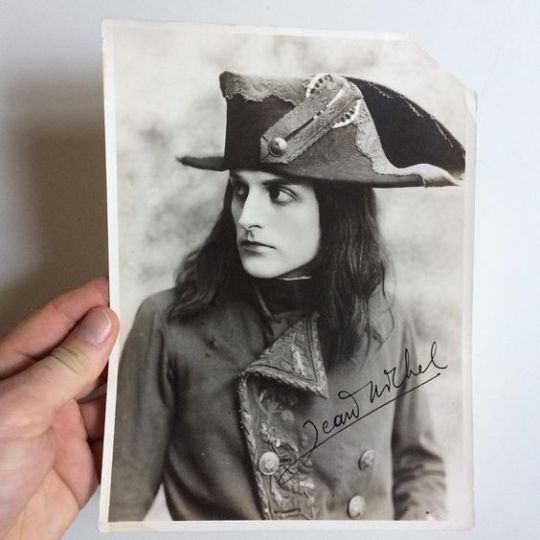
An actor who played Napoleon before Abel Gance did (Jean Napoléon Michel). He is very pretty! Reminds me of Patrice Alexsandre who played St. Just in la force des choses
From pinterest which took it from instagram.
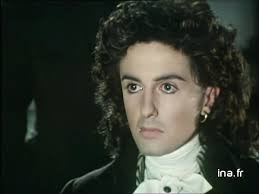
43 notes
·
View notes
Text
The Dream That Dreams Once Dreamt Of
Summary:
“… many of Napoleon's senior officers have become characters of folklore, if not downright fiction. His marshals, especially, have been so bedaubed by careless writers' ink that the true personalities of some of them remain almost unknown.” — Swords Around A Throne, John R. Elting
A strange surreal fairytale about a man-eating ogre and a heroic knight with legs of stone.
Relationship: Napoleon Bonaparte/Jean Lannes
Characters: Napoléon I de France | Napoléon Bonaparte, Jean Lannes, very brief mentions of the following: Michel Ney, Jean-Baptiste Bessières, Andre Masséna, Charles-Victor Perrin
Fandoms: Napoleonic Era RPF, Historical RPF
Additional Tags: Alternate Universe - Afterlife, Alternate Universe - Fairy Tale, Alternate Universe - Fantasy, Body Horror, mentions of cannibalism, Mentions of Ensemble Cast
Words: 3,076
Chapters: 1/1
#napoleonic rpf#historical rpf#cadmus writes#lannap#jean lannes#napoleonic era#cadmus rambles#this is peak cad pretentiousness#wakes up way too early decides to post this going back to sleep#marshalate rpf
34 notes
·
View notes
Text
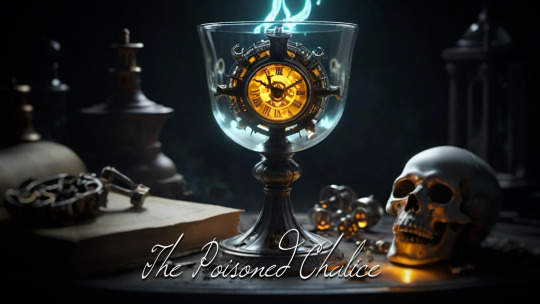
The Poisoned Chalice
Rating: Teen And Up Audiences
Archive Warning: Major Character Death
Category: F/M
Fandoms: Napoleonic Era RPF, French History RPF, 19th Century CE RPF, Historical RPF
Relationship:
Josephine de Beauharnais Bonaparte/Napoléon I de France | Napoléon Bonaparte
Characters:
Napoléon I de France | Napoléon Bonaparte, Josephine de Beauharnais Bonaparte, Jean Lannes, Joachim Murat, Louis-Alexandre Berthier, André Masséna, Jean-Baptiste Bessières, Jean-Andoche Junot, Michel Ney, Hudson Lowe, Paul Barras, Ensemble
Additional Tags:
Terminal Illnesses, Fate & Destiny, Death, Afterlife, Myth & Folklore, Faustian Bargain, Magical Realism, Dubious Morality, Historical References, 19th Century, Ridley Scott can bite me, r/Fanfiction Exchange, Bittersweet Ending, Napoleonic Wars, Podfic Welcome
Collections: Fandom Diversity Fest Fate and Luck
Words: 2,500
Chapters: 1/1
Summary:
When he was eight years-old, Napoleone di Buonaparte dreamt of glory on the battlefield, but the man in red saw he had an even far greater destiny ahead of him.
Echoing down through the centuries, dark rumors trail the legend of the man in red. Dressed all in crimson, be he demon, goblin, ghost, or the Devil himself, he appears when the nation of France stands on the precipice of great upheaval.
Now, Napoleon Bonaparte is fifty-one years old and he lies dying in the clutches of his captors, far from home. Does he have any last regrets?
This fic was written for the Fate and Luck Fest on the r/FanfictionExchange subreddit!
Special thanks to @cadmusfly for beta reading!
10 notes
·
View notes
Text
The napoleonic marshal‘s children
After seeing @josefavomjaaga’s and @northernmariette’s marshal calendar, I wanted to do a similar thing for all the marshal’s children! So I did! I hope you like it. c:
I listed them in more or less chronological order but categorised them in years (especially because we don‘t know all their birthdays).
At the end of this post you are going to find remarks about some of the marshals because not every child is listed! ^^“
To the question about the sources: I mostly googled it and searched their dates in Wikipedia, ahaha. Nevertheless, I also found this website. However, I would be careful with it. We are talking about history and different sources can have different dates.
I am always open for corrections. Just correct me in the comments if you find or know a trustful source which would show that one or some of the dates are incorrect.
At the end of the day it is harmless fun and research. :)
Pre 1790
François Étienne Kellermann (4 August 1770- 2 June 1835)
Marguerite Cécile Kellermann (15 March 1773 - 12 August 1850)
Ernestine Grouchy (1787–1866)
Mélanie Marie Josèphe de Pérignon (1788 - 1858)
Alphonse Grouchy (1789–1864)
Jean-Baptiste Sophie Pierre de Pérignon (1789- 14 January 1807)
Marie Françoise Germaine de Pérignon (1789 - 15 May 1844)
Angélique Catherine Jourdan (1789 or 1791 - 7 March 1879)
1790 - 1791
Marie-Louise Oudinot (1790–1832)
Marie-Anne Masséna (8 July 1790 - 1794)
Charles Oudinot (1791 - 1863)
Aimee-Clementine Grouchy (1791–1826)
Anne-Francoise Moncey (1791–1842)
1792 - 1793
Bon-Louis Moncey (1792–1817)
Victorine Perrin (1792–1822)
Anne-Charlotte Macdonald (1792–1870)
François Henri de Pérignon (23 February 1793 - 19 October 1841)
Jacques Prosper Masséna (25 June 1793 - 13 May 1821)
1794 - 1795
Victoire Thècle Masséna (28 September 1794 - 18 March 1857)
Adele-Elisabeth Macdonald (1794–1822)
Marguerite-Félécité Desprez (1795-1854); adopted by Sérurier
Nicolette Oudinot (1795–1865)
Charles Perrin (1795–15 March 1827)
1796 - 1997
Emilie Oudinot (1796–1805)
Victor Grouchy (1796–1864)
Napoleon-Victor Perrin (24 October 1796 - 2 December 1853)
Jeanne Madeleine Delphine Jourdan (1797-1839)
1799
François Victor Masséna (2 April 1799 - 16 April 1863)
Joseph François Oscar Bernadotte (4 July 1799 – 8 July 1859)
Auguste Oudinot (1799–1835)
Caroline de Pérignon (1799-1819)
Eugene Perrin (1799–1852)
1800
Nina Jourdan (1800-1833)
Caroline Mortier de Trevise (1800–1842)
1801
Achille Charles Louis Napoléon Murat (21 January 1801 - 15 April 1847)
Louis Napoléon Lannes (30 July 1801 – 19 July 1874)
Elise Oudinot (1801–1882)
1802
Marie Letizia Joséphine Annonciade Murat (26 April 1802 - 12 March 1859)
Alfred-Jean Lannes (11 July 1802 – 20 June 1861)
Napoléon Bessière (2 August 1802 - 21 July 1856)
Paul Davout (1802–1803)
Napoléon Soult (1802–1857)
1803
Marie-Agnès Irma de Pérignon (5 April 1803 - 16 December 1849)
Joseph Napoléon Ney (8 May 1803 – 25 July 1857)
Lucien Charles Joseph Napoléon Murat (16 May 1803 - 10 April 1878)
Jean-Ernest Lannes (20 July 1803 – 24 November 1882)
Alexandrine-Aimee Macdonald (1803���1869)
Sophie Malvina Joséphine Mortier de Trévise ( 1803 - ???)
1804
Napoléon Mortier de Trévise (6 August 1804 - 29 December 1869)
Michel Louis Félix Ney (24 August 1804 – 14 July 1854)
Gustave-Olivier Lannes (4 December 1804 – 25 August 1875)
Joséphine Davout (1804–1805)
Hortense Soult (1804–1862)
Octavie de Pérignon (1804-1847)
1805
Louise Julie Caroline Murat (21 March 1805 - 1 December 1889)
Antoinette Joséphine Davout (1805 – 19 August 1821)
Stephanie-Josephine Perrin (1805–1832)
1806
Josephine-Louise Lannes (4 March 1806 – 8 November 1889)
Eugène Michel Ney (12 July 1806 – 25 October 1845)
Edouard Moriter de Trévise (1806–1815)
Léopold de Pérignon (1806-1862)
1807
Adèle Napoleone Davout (June 1807 – 21 January 1885)
Jeanne-Francoise Moncey (1807–1853)
1808: Stephanie Oudinot (1808-1893)
1809: Napoleon Davout (1809–1810)
1810: Napoleon Alexander Berthier (11 September 1810 – 10 February 1887)
1811
Napoleon Louis Davout (6 January 1811 - 13 June 1853)
Louise-Honorine Suchet (1811 – 1885)
Louise Mortier de Trévise (1811–1831)
1812
Edgar Napoléon Henry Ney (12 April 1812 – 4 October 1882)
Caroline-Joséphine Berthier (22 August 1812 – 1905)
Jules Davout (December 1812 - 1813)
1813: Louis-Napoleon Suchet (23 May 1813- 22 July 1867/77)
1814: Eve-Stéphanie Mortier de Trévise (1814–1831)
1815
Marie Anne Berthier (February 1815 - 23 July 1878)
Adelaide Louise Davout (8 July 1815 – 6 October 1892)
Laurent François or Laurent-Camille Saint-Cyr (I found two almost similar names with the same date so) (30 December 1815 – 30 January 1904)
1816: Louise Marie Oudinot (1816 - 1909)
1817
Caroline Oudinot (1817–1896)
Caroline Soult (1817–1817)
1819: Charles-Joseph Oudinot (1819–1858)
1820: Anne-Marie Suchet (1820 - 27 May 1835)
1822: Henri Oudinot ( 3 February 1822 – 29 July 1891)
1824: Louis Marie Macdonald (11 November 1824 - 6 April 1881.)
1830: Noemie Grouchy (1830–1843)
——————
Children without clear birthdays:
Camille Jourdan (died in 1842)
Sophie Jourdan (died in 1820)
Additional remarks:
- Marshal Berthier died 8.5 months before his last daughter‘s birth.
- Marshal Oudinot had 11 children and the age difference between his first and last child is around 32 years.
- The age difference between marshal Grouchy‘s first and last child is around 43 years.
- Marshal Lefebvre had fourteen children (12 sons, 2 daughters) but I couldn‘t find anything kind of reliable about them so they are not listed above. I am aware that two sons of him were listed in the link above. Nevertheless, I was uncertain to name them in my list because I thought that his last living son died in the Russian campaign while the website writes about the possibility of another son dying in 1817.
- Marshal Augerau had no children.
- Marshal Brune had apparently adopted two daughters whose names are unknown.
- Marshal Pérignon: I couldn‘t find anything about his daughters, Justine, Elisabeth and Adèle, except that they died in infancy.
- Marshal Sérurier had no biological children but adopted Marguerite-Félécité Desprez in 1814.
- Marshal Marmont had no children.
- I found out that marshal Saint-Cyr married his first cousin, lol.
- I didn‘t find anything about marshal Poniatowski having children. Apparently, he wasn‘t married either (thank you, @northernmariette for the correction of this fact! c:)
#Marshal‘s children calendar#literally every napoleonic marshal ahaha#napoleonic era#Napoleonic children#I am not putting all the children‘s names into the tags#Thank you no thank you! :)#YES I posted it without double checking every child so don‘t be surprised when I have to correct some stuff 😭#napoleon's marshals#napoleonic
71 notes
·
View notes
Text
So I looked for letters by Duroc and ... there will be an edition of his correspondence coming out in September! Whopping 2,800 letters!
The bad news: It's 98.- €.
17 notes
·
View notes
Text
NE TUONS PAS SAINT-MICHEL
PC
A Roubaix
Jean-Marie Duriez
Est Napoléon Solo
Et en même temps
Cerbère le chien gardien des Enfers
PC Croix Isabelle Alonso
Chienne de garde mentionnée
Pas Jeannette Vermeersch
La Stalinienne
PC plus Uranus
Il accueille la Passionaria
Et des mitterrandienss du PS
La Rose et le Réséda Palais Bourbon
Une gauche eurocommuniste coupable
Louis Aragon meurt seul
Son combat contre Marchaiss tu
Terrible la communiste omerta
Dimanche 14 janvier 2024
0 notes
Text
Aphorismes anti-dépression
« Perdre est pardonnable. Être surpris est impardonnable. », Frédéric Legrand.
« Si tu veux faire un kilomètre commence par faire un centimètre. », Mohamed Ali.
« La vie ce n’est pas d’attendre que l’orage passe c’est d’apprendre à danser sous la pluie. », Sénèque.
« Il n’existe rien de constant si ce n’est le changement. », Bouddha.
« Fais le vide dans ton esprit, sois sans forme. Informe, comme l’eau. Si tu mets de l’eau dans une tasse, elle devient la tasse. Tu mets de l’eau dans une bouteille, elle devient la bouteille. Si tu la mets dans une théière, elle devient la théière. L’eau peut couler ou elle peut écraser. », « Non pas l'accumulation au quotidien mais la perte au quotidien. Supprimez le superficiel. », Bruce Lee.
« Rien n’est grave. », Michel Ardouin[1].
« Sois libre comme l'air. Tout ce qui a pu prendre une place dans ta vie, tu dois pouvoir t'en débarrasser en trente secondes montre en main. », Michael Mann.
« Celui qui n’évolue pas disparaît. », Charles Darwin.
« D’abord ils rient de vous. Ensuite ils vous combattent. Puis vous gagnez. », Mohandas Gandhi.
« L’espérance, c’est la volonté des faibles », « les dictateurs naissent dans les maisons où on n’ose pas donner un ordre à la bonne », « Nous avons deux sortes de bonheurs : ceux que nous obtenons sans faire de tort à personne, et ceux que nous obtenons en poignardant quelqu’un. », Henry de Montherlant.
« Ne pas reconnaître sa valeur c’est faciliter la réussite des médiocres », Michel Audiard.
« Ne dites jamais du mal de vous ; vos amis en diront toujours assez. », Talleyrand.
« Marche ou crève », citation d’un livre de Stephen King, d’un film de Georges Lautner, d’un album de Trust et du 1er BEP.
« Si vous voulez suivre La Voie des Hommes, si vous voulez faire avancer un retour à l'honneur et à la vertu virile, si vous voulez vous protéger d'un avenir incertain, créez un gang. », Jack Donovan.
« Le succès ne s’explique pas. L’échec ne s’excuse pas. », « Nos ennemis sont 400 000 et nous ne sommes que 300 000 ? Avec moi nous serons 450 000. », « On ne fait bien que ce qu’on fait soi-même. », Napoléon Bonaparte.
« Il n’y a que ceux qui ne font rien qui ne se trompe jamais. » Théodore de Banville.
« Seul le vainqueur ne croit pas au hasard », « Je ne suis pas un homme, je suis de la dynamite. » Friedrich Nietzsche.
« Éviter les besoins, plutôt que de les satisfaire », Épicure.
« Un gros coup de cul ça se provoque ! », André Dussolier alias Robert Mancini dans 36 quai des orfèvres d’Olivier Marchal.
« Gros homme si tu joues, je vais être obligé de te fesser les joues ! », « Eh bien ! Oui, c’est mon vice. Déplaire est mon plaisir. J’aime qu’on me haïsse ! », « On n’abdique pas l’honneur d’être une cible. », Edmond Rostand.
« En 1808, au cours de son voyage dans l’Ouest, Napoléon rencontra aux Quatre-Chemins-de-l’Oie une héroïne de la grande révolte vendéenne. À vingt ans, elle avait combattu les Bleus pistolet au poing. On la présenta à l’Empereur qui l’embrassa et la fit embrasser par l’Impératrice. À ce moment, un homme s’avança. Napoléon l’interrogea :
Et vous, Monsieur qui saluez si bas, qui êtes-vous ?
Mais, répondit l’autre, je suis le maire de Saint-Florent, le frère de Mademoiselle Regrenil
Que faisiez-vous, interrogea l’Empereur, pendant que votre sœur se battait si bien ?
Et le maire, se croyant habile, répondit :
Sire, moi j’étais neutre.
Neutre ! Éclata Napoléon, alors vous n’êtes qu’un lâche, un jean-foutre.
Et il le chassa de sa vue. », Dominique Venner.
« Je ne tiens pas assez à la vie pour craindre la mort. », Alexandre Dumas.
« Si tu compares le sort de deux hommes, dont l’un est doué d’un vrai mérite et l’autre jouit d’une fausse gloire, tu verras ce dernier plus heureux que son rival et presque toujours plus riche. L’imposture excelle et triomphe dans le mensonge, mais sans l’imposture, la vérité ne peut rien. Cela n’est pas dû, à mes yeux, à quelque mauvais penchant de notre espèce, mais au fait que la vérité est toujours trop simple et trop pauvre pour contenter les hommes, qui réclament pour se divertir ou s’émouvoir, une part d’illusion et d’erreur : il faut qu’on leur promette plus et mieux qu’on ne pourra jamais leur donner. La Nature est la première à nous abuser ainsi car c’est essentiellement par l’illusion et le mensonge qu’elle nous rend la vie aimable, ou tout au moins, supportable. », « Les faibles vivent suivant le bon plaisir du monde, et les forts, selon le leur. », Giacomo Leopardi.
« Tout le monde à un plan jusqu’à ce que vous vous preniez une droite dans la gueule », Mike Tyson.
« Celui qui n’aime pas la vie ne la mérite pas », Léonard de Vinci.
« La révolution est l’œuvre d’une minorité résolue, inaccessible au découragement, d’une minorité dont la masse ne comprend pas les premiers mouvements parce que, victime d’une période de décadence, elle a perdu cette chose précieuse qu’est la lumière intérieure. », José Antonio Primo de Riveira.
« Celui qui n’a pas d’objectifs ne risque pas de les atteindre. », « Il faut feindre la faiblesse, afin que l'ennemi se perde dans l'arrogance. », Sun Tzu.
Je n’arrive pas à retrouver un épisode textuel dans le Roman vrai d’un fasciste français de Christian Rol où le père dit à son fils quelque chose comme : « Va mon fils mais achètes des chaussures neuves : une vie d’homme libre s’affronte avec des souliers cirés. »
« Le passé est incontrôlable, le futur est imprévisible », Karl Lagerfeld.
« Le hasard n’existe pas », Karl Schmitt.
« Un bon braquo, ça se prépare », Jeannot dans les Lyonnais d’Olivier Marchal.
« On obtient beaucoup en demandant poliment. On obtient encore plus en demandant poliment avec un calibre. », Al Capone.
« Le chemin est court. Autant le faire en première classe. », Philippe Noiret.
« J'ai été plusieurs fois millionnaire, mais l'argent est reparti à chaque fois et aussi facilement qu'il était venu. Je n'accorde de l'importance à l'argent que lorsque je le dépense. Si je devais économiser, je ne serais pas moi-même et je n'aurai pas pu vivre ces aventures intenses qui furent les miennes. Une mentalité étriquée ne permet pas de vivre quelque chose de grand. Toute ma vie, mon dernier centime sera dépensé pour la flambe, le confort, pour ne jamais faire de concessions à la médiocrité. », Cizia Zykë.
Personne ne vous donnera quoique ce soit spontanément il faut toujours demander. Et si vous n’obtenez rien il faut voler, un de mes professeurs d’école de commerce.
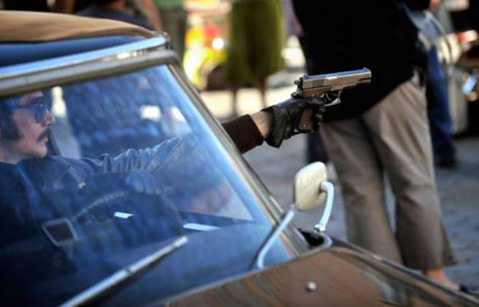
[1] Garde du corps du braqueur Jacques Mesrine. Lire à ce sujet Mesrine mon associé du même auteur.
0 notes
Text
Ulm
As the Allies advanced, Napoleon raced to the critical point, exploiting the superior mobility of his corps, which had billets and supplies arranged by local authorities waiting for them. The smooth and rapid movement of such a large army was unprecedented: the French troops averaged some twenty miles per day. The Grande Armée reached the Rhine river by late September, and after crossing at various locations between September 26 and October 2, it advanced toward the Danube. This speedy advance once again revealed a key feature of Napoleon's character: his willingness to accept long-term political risks for immediate strategic and operational advantages. To threaten the enemy position, Napoleon pushed his I and II Corps through the Prussian territory of Ansbach, flagrantly violating its neutrality. This was a politically perilous decision, but in Napoleon's mind it was justified by military need. It took the Austrians by surprise, as they had received assurances that Prussia would oppose any such move, and so they were convinced of the security of their rear. Napoleon's gamble paid off, but it caused considerable outrage in Prussia and led to calls for war.
Napoleon needed to act quickly, and act quickly he did. With his spies reporting that Mack had concentrated his forces around Ulm, he issued a new set of orders designed to cut the Austrians off from the Russians and destroy them piecemeal. By early October Napoleon's forces were advancing in six great columns in a wide arc around to the north and then east of Mack's position. An important element in Napoleon's plan was his use of intelligence to deceive his enemy, with French agents Charles (Karl) Louis Schulmeister and Edouard Fetny well placed inside Austrian headquarters to supply misinformation to the Austrian command while transmitting crucial Austrian military plans to Napoleon.
By September 30 Mack had realized that he was in danger of being encircled, and he tried to break out of the trap and open a line of retreat toward Vienna. In the first two weeks of October the Austrians suffered a series of major defeats: at Wertingen (October 8), Marshals Joachim Murat and Jean Lannes mauled the Austrian forces under Franz Auffenberg; at Haslach (October 11), some 4,000 French troops commanded by General Pierre Dupont managed to withstand an assault by 25,000 Austrians; at Elchingen (October 14), Marshal Michel Ney routed the Austrians and prevented them from escaping north of the Danube while most of Napoleon's forces were south of the river. By then, the French had two corps in the vicinity of Munich, eighty miles east of Mack, severing his line of communication and closing off his more southerly routes of escape. Napoleon's swift advance and victories demoralized the Austrian army. With the Russians still over a hundred miles away, Mack surrendered his forces, consisting of some 23,500 men and sixty-five pieces of artillery, at Ulm on October 19-20.

The victory at Ulm was a remarkable success. In less than two months Napoleon had marched some 200,000 men from the Atlantic coast into Bavaria and achieved his major objective of annihilating the enemy without even needing to fight a major battle. It was this success, achieved at the operational level rather than the tactical, that led his men to joke that Napoleon had found a new way to make war: with their legs rather than their arms.
Alexander Mikaberidze- The Napoleonic Wars, A Global History
#napoleonic#alexander mikaberidze#the napoleonic wars: a global history#napoléon bonaparte#campaign of ulm austerlitz#battle of wertingen#battle of haslach#battle of elchingen#surrender of ulm#schulmeister#édouard fetny#joachim murat#jean lannes#general dupont#michel ney
25 notes
·
View notes
Text
Anonymous asked: I loved your fantastic account of the battle of Waterloo and how each nation came to define the rest of the century for all the European countries in different ways. However what are your thoughts about the battle itself? Did Wellington win it or did Napoleon lose it? What were the turning points that you think determined the fate of the battle?
Thank you for reading and liking my previous post on Waterloo. I did heavily lean into studying ancient classical warfare when I was studying Classics but I only got into Napoleonic warfare because of a father who was (and still remains) big Napoleonic warfare military enthusiast. Through his keen eyes as a former serving military man, I also looked at the battle as a soldier might as well putting on my academic critical thinking cap. It’s a popular parlour game not just in Sandhurst but also in the officers’ mess (where those regiments actually fought at Waterloo) and around dinner tables - in my experience anyway.
I’ve always seen such speculative and counterfactual questions as an amusing diversion. I’ve never seriously looked at the detail until I came to France and unexpectedly interacted with Napoleonic scholars as well as soldiers (the cultured and historically well read ones at least) that forced me to think more about it. I’ve always been of the ‘if the Prussians hadn’t arrived in time to save Wellington’ school; and this was always enough to get me by in any conversation.
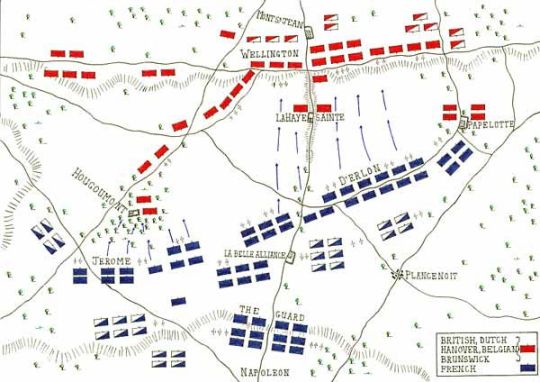
But my vanity was stung by interacting with one of my downstairs neighbours, a high decorated retired army general, with whom I played a weekly game of chess over a glass of wine during the Covid lockdown in Paris. He didn’t spare me as he knew so much detail about the battle. But a typical failing of French thinking is to pontificate around generalities rather than specific reasons. So for him it came down to pooh-poohing the generalship of Wellington (the rain saved him) and lauding the emperor (he had haemorrhoids and thus a bad day at the office). So rain and haemorrhoids were the decisive factors in determining the outcome of the battle of Waterloo.
It was clear I had to raise my game. So I’ve been reading more when I could.
I had recently finished reading a wonderful book ‘The Longest Afternoon: The 400 Men Who Decided the Battle of Waterloo’ by the Cambridge historian Brendan Simms. The book came out in 2015 but it’s been lying on my shelf for these past few years until I actually took this slim book to read on my one of my business trips.
The idea behind this short book is so superbly useful. It places to one side the huge, cinematic panorama of history and instead concentrates on one particular farmhouse, on one particular day: 18 June 1815. History is vivified, lifts itself off the page and into the mind, when a historian of Brendan Simm’s immense stature zooms in on the details - and here the details are compelling.

For the course of one day, 400 soldiers, wet, cold, in some cases hungover, who had bivouacked for the night in an abandoned farmhouse at La Haye Sainte, near a crucially strategic crossroads, found themselves staring down the massed barrels of Napoleon’s vanguard – and held them off. On June 18, 1815, Wellington established his position and sent one battalion and part of a second to the farmhouse under the command of Major Baring. Napoléon’s initial attack was a direct assault that surrounded the house and came near to breaking Wellington’s line; but it held, and the legendary charge of two British heavy cavalry brigades drove back the French.
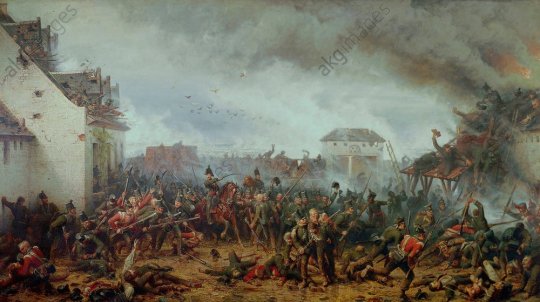
This is a detailed account of the defence of La Haye Sainte, a walled stone farmhouse forward of Wellington’s centre. Its defenders were the King’s German Legion, which (despite the British army’s penchant for oddball names) was genuinely German. Britain harboured many German expatriates who detested Napoléon, a number augmented in 1803 when he occupied Hanover and disbanded its army. That very year two ambitious officers recruited the first members of the King’s German Legion, which grew into a corps of some 14,000 men and served with distinction at Copenhagen, Walcheren and in Spain before its apotheosis at Waterloo.
Ordered to capture the farmhouse, Marshal Michel Ney - commanding Napoléon’s left wing - obeyed but became preoccupied with his famously unsuccessful cavalry attack. Reminded of the order two hours later, he dispatched infantry that reached the house and set it on fire. The men inside controlled the blaze and continued to fight until Ney took personal charge of a furious assault that succeeded only when the defenders ran out of ammunition and withdrew, having held out for six hours. Had they not defended it so stoutly and if the farm had fallen any sooner then Napoleon would have been able to get at Wellington’s troops before his Prussian reinforcements arrived, and in all likelihood Waterloo would have been a French victory instead; it would now be the name of a train station in Paris rather than London.

I doubt there is a definitive answer to this question which is why certain people love arguing about it because it’s so open ended in terms of cause and effect. You can pick on any episodic event and hail that as the decisive turning point. It’s one reason why we are so fortunate to have so many well researched history books on the battle of Waterloo to replenish the issues for a newer generation to argue with past generations.
If I were to go beyond the ‘if the Prussians hadn’t arrived to save Wellington’ line then I would point to ten decisive turning points which in themselves might not have changed the outcome but taken together certainly influenced the final outcome of one of the most important and iconic battles in history.

Napoleon gives Marshal Davout a desk job
6 June 1815 – All commanders need a good chief of staff to ensure that their intentions are translated into clear orders. Unfortunately for Napoleon – as what is arguably one of the most decisive battles in European history loomed – his trusted chief of staff, Marshal Berthier, was no longer available. Berthier had sworn an oath of loyalty to Louis XVIII – and then fallen to his death from a window – so the job was given to Marshal Soult.
Soult was an experienced field commander but he was certainly no Berthier. Napoleon’s two main field commanders were also far from ideal. Emmanuel Grouchy had little experience of independent command. Michel Ney’s heroic command of the French rear-guard during the retreat from Moscow led Napoleon to dub him “the bravest of the brave”, but by 1815 he was clearly burnt out.
Worse still, when on 6 June Napoleon ordered his generals to assemble with their troops on the Belgian border he chose to leave behind Louis-Nicolas Davout, his ‘Iron Marshal’, as minister of war. The emperor needed someone loyal to oversee affairs at home but the decision not to take with him the ablest general at his disposal would deprive him of the one commander who might have made a difference.
Constant Rebecque ignores orders
15 June – In June 1815 Napoleon assembled 120,000 men on the Belgian border. Opposing him were 115,000 Prussians under Field Marshal Blücher and an allied force of about 93,000 men under Wellington. Faced with such odds, Napoleon’s best chance of victory was to get his army between his two enemies and defeat one before turning on the other. On 15 June his army crossed the frontier at Charleroi and headed straight for the gap between the two allied armies.
Wellington was taken completely by surprise: “Napoleon has humbugged me” he said. Uncertain what Napoleon’s intentions were, he ordered his army to concentrate around Nivelles, over 12 miles away from the Prussian position at Ligny. This would have left the two allied armies dangerously separated but fortunately for Wellington, a staff officer in the Dutch army, Baron Constant Rebecque, understood what was actually needed. He disregarded Wellington’s order and instead sent a force to occupy the key crossroads of Quatre Bras, much nearer to the Prussians.

D’Erlon misses the show
16 June – Two battles were fought on 16 June. While Marshal Ney took on Wellington’s army as it hurriedly tried to concentrate around Quatre Bras, Napoleon led the main French force against the Prussians at Ligny. Blücher’s inexperienced Prussians were given a severe mauling but despite this they managed to fall back in relatively good order.
This was partly due to a disastrous mix-up on the part of the French. Confusion over orders saw General D’Erlon’s corps instructed to leave Ney’s army at Quatre Bras and join the fighting at Ligny only to be recalled as soon as they got there. The result was that 16,000 Frenchmen who could have intervened decisively actually took part in neither battle.
Blücher stays in touch
17 June – Wellington succeeded in beating back Ney at Quatre Bras but Blücher’s defeat left the British general with a large French army on his eastern flank. He was forced to fall back northwards towards Brussels. The Prussians were retreating as well. Normally a retreating army tries to withdraw along its lines of communication (ie the route back to its base). Had the Prussians done this they would have headed eastwards. The two allied armies would then have been even further apart and Wellington would have been overwhelmed. But instead of doing that, the Prussians retreated northwards towards Wavre. It was to be a crucial move. The two allied armies stayed in contact and on 17 June Wellington was able to fall back to the ridge at Mont St Jean, and prepare to make a stand there until Blücher’s Prussians could come to his aid.

The weather takes a hand
17 June – The night before the battle was marked by a thunderstorm of biblical proportions. Rain lashed down, turning roads into quagmires and trampled fields into seas of mud.
It was a night of tremendous rain and cloudbursts. Wellington said that even in the monsoons in India, he’d never known rain like it. To wake up cold and damp, wet and terrified, then you have this slaughter in a very small space. By evening there were over 200,000 men struggling to kill each other within four square miles.
Private Wheeler of the 51st Regiment later wrote: “The ground was too wet to lie down… the water ran in streams from the cuffs of our Jackets… We had one consolation, we knew that the enemy were in the same plight.” Wheeler was right of course – the rain would inconvenience all three armies, not least the Prussians as they struggled along narrow country lanes to link up with Wellington.
It’s often said that Napoleon delayed starting the battle in order to allow the ground to dry out but the chief cause of the delay was probably the need to allow his units, many of whom had bivouacked some distance away, to take up their allotted places. Napoleon enjoyed a considerable advantage in artillery at Waterloo but this was lessened by the fact that the mud made it difficult to move his guns around and that cannonballs, normally designed to bounce along until they hit something, or someone, often disappeared harmlessly into the soggy ground.
Macdonnell closes the gates
11:30am, 18 June – On 18 June the two armies prepared to do battle. Most of Wellington’s troops were sheltered from enemy fire on the reverse slope of the Mont St Jean ridge. The position was protected by three important outposts: a group of farms to the left, the farm of La Haye Sainte in front and the farmhouse of Hougoumont to the right.
At about 11.30am the French launched their first attack – an assault on Hougoumont. This soon developed into a battle within a battle as the French threw in ever more men in a bid to capture the vital chateau. They nearly succeeded: led by a giant officer nicknamed ‘the Smasher’, a group of French soldiers worked their way round to the rear of the chateau, forced open its north gate and burst inside.
James Macdonnell, the garrison commander, acted quickly. He gathered a group of men and they heaved the gate shut again. The French inside the chateau were then hunted down and killed. Only a young drummer boy was spared. Hougoumont was to remain in allied hands all day and Wellington later commented that the entire result of the battle depended on the closing of those gates.

Ney loses his head after his cavalry founders
1.30pm – The infantry of D’Erlon’s corps finally saw action as they attacked the left wing of Wellington’s army. As they reached the crest of the ridge they were met by the infantry of Sir Thomas Picton’s division. Picton, a foul-mouthed Welshman who rode into battle in a civilian coat and round-brimmed hat, was shot dead but his men stopped the French, who were then driven back by Wellington’s cavalry.
The next major French attack was very different. Ney unleashed his cavalry in a mass frontal attack, and thousands of Napoleon’s famous cuirassiers – big men in steel breastplates riding big horses – thundered up the hill. But Wellington’s infantry stayed calm. Forming squares, they presented in all directions a hedge of bayonets that no horse could be made to charge.
Ney needed to call the cavalry off or support them with infantry but he lost his head and threw more horsemen into the fray. When he abandoned these fruitless attacks, Wellington’s line was still unbroken, two hours had been wasted, and the Prussians were arriving in force.

The Prussians arrive
4.30pm – Blücher had promised to come to Wellington’s aid, and kept his word. Napoleon had detached nearly a third of his army under Grouchy to prevent the Prussians joining up with Wellington but Grouchy failed to do this and, by mid-afternoon, the first Prussian units were in action on the battlefield.
At about 4.30pm they launched their first attack upon the key village of Plancenoit near the rear of Napoleon’s main position. This savage battle would rage for over three hours. Faced with this, Napoleon was forced to send many of his remaining reserves to shore up his position – leaving him with precious few troops to exploit any success his troops might enjoy against Wellington.

Napoleon says no, and von Zeithen turns back
6.30pm – At about 6.30pm the French captured La Haye Sainte. Posting artillery and skirmishers around the farm, they unleashed a storm of shot, shell and musketry into Wellington’s exposed centre. The regiments there suffered horrendous casualties, but Wellington’s line held – just.
Ney asked for reinforcements to press home his advantage but Napoleon refused. Instead he sent troops to recapture Plancenoit which had just fallen to the Prussians. Von Zeiten’s Prussian I Corps arrived on the scene. These much-needed reinforcements were set to join Wellington when a Prussian aide de camp rode up with an order from Blücher instructing them to head south and support his troops at Plancenoit. Von Zeiten obeyed. Realising that Von Zeiten’s troops were desperately needed on the ridge, Baron von Müffling, Wellington’s Prussian liaison officer, galloped after Von Zeiten and pleaded with him to ignore this new order and stick to the original plan. The Prussian general turned back and took his place on Wellington’s left, enabling the duke to shift troops over to reinforce his crumbling centre. The crisis had passed.
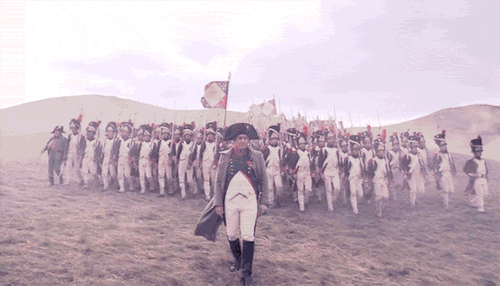
Napoleon’s last roll of the dice ends in panic
7.30pm – With Plancenoit back in French hands the stage was set for the final act in the drama. At about 7.30pm Napoleon unleashed his elite imperial guard in a last desperate bid for victory. But it was too late – they were hopelessly outnumbered and Wellington was ready for them. His own troops had been sheltering from the French fire by lying down but when the two large columns of French guardsmen reached the crest of the ridge Wellington ordered his own guards to stand up. One British guardsman describes the scene: “Whether it was (our) sudden appearance so near to them, or the tremendously heavy fire we threw into them but La Garde, who had never previously failed in an attack, suddenly stopped.”
Meanwhile Sir John Colborne of the 52nd Light Infantry wheeled his regiment round to attack the flank of the first French column while General Chasse ordered his Dutch and Belgian troops forward against the other. Soon both French columns had withered away under the deadly fire. Their defeat led to widespread panic in the French army: amid cries of “La Garde recule” (“the Guard is retreating”) it dissolved into a disorderly retreat mercilessly harried by the Prussians. “The nearest-run thing you ever saw in your life,” as Wellington described the battle, was over.
This isn’t an exhaustive list but it will do.
Waterloo was a watershed moment for Europe, and indeed the world. The end of the Napoleonic Wars heralded a peace in Europe which was not broken until the outbreak of World War One in 1914. In the century following the Battle of Waterloo an increased respect developed for the figure of the soldier. True the Battle became mythologised in the nineteenth century and is now embedded in our cultural memory as one of the great British success stories.
We still celebrate Waterloo because it was a great British victory - even if we had a little bit of help from the Prussians. It embodied the British bulldog spirit and marked the moment we finally overcame Napoleon and his empire after a decade of being at war.
The ramifications from Waterloo and the Napoleonic Wars are still felt today in contemporary European politics. I think because of this the battle continues to fascinate and to court intense discussion and disagreement.
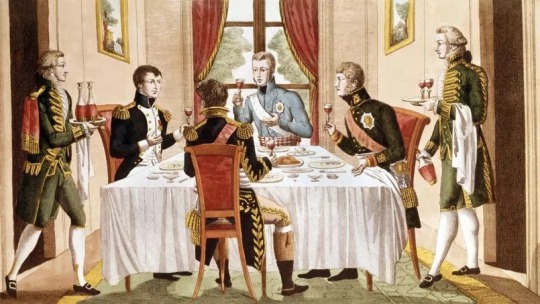
No doubt my French neighbour the retired army general and I will continue to stubbornly argue our differing viewpoints until the wine bottle empties. But we both agree that we would enjoy having dinner with Napoleon and talk about his military campaigns. I admire Napoleon a little more having read more and for living in France. He’d be a very amusing and stimulating companion.
In many ways, he was also an enlightened and intelligent ruler. His Code Napoleon is an extremely enlightened law code. At the same time this is a man who had a very, very low threshold for boredom. I think he was addicted to war.
General Robert E. Lee, at Fredericksburg said, “It is well that war is so dreadful, otherwise we would grow too fond of it.”
Napoleon would never have agreed with that. War was his drug. There’s no evidence that Wellington enjoyed war. He said after Waterloo, and I believe him, “I pray to God that I have fought my last battle.” He spent much of the battle saying to the men, “If you survive, if you just stand there and repel the French, I’ll guarantee you a generation of peace.” He thought the point of war was peace. And he sure gave not just Britain but also an entire European continent some respite from the spilling of blood on a battlefield.
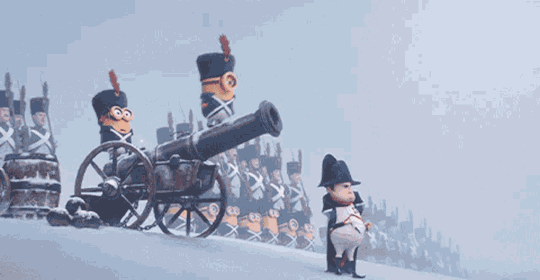
Thanks for your question.
#question#ask#waterloo#battle#battle of waterloo#napoleon#wellington#history#britain#france#prussia#austria#german#europe#military#british army#soldier
89 notes
·
View notes
Text

Coup d'État du 18 brumaire, par lequel Napoléon Bonaparte prend le pouvoir...
Revue de Presse. Arrestation de Me de Araujo-Recchia : le délire paranoïaque de la Macronie
Un article de l’anthropologue Suisse, Jean-Dominique Michel, présenté sur son site :
https://anthropo-logiques.org/arrestation-de-me-de-araujo-recchia-le-delire-paranoiaque-de-la-macronie/
Nous attendions anxieusement des nouvelles quant aux motifs de l’arrestation suivie du placement en garde à vue de Me Virginie de Araujo-Recchia. Elles sont finalement tombées et sont tout sauf rassurantes. Nous avons en effet appris avec stupéfaction que l’État français invoquait…. un projet de coup d’état comme motif à une rafle dans les milieux opposées à la dérive tyrannique et totalitaire du sociopathe tenant lieu de président, de ses commanditaires et de ses sbires.
L’accusation en temps normal serait risible tant elle est grotesque : les fomenteurs de vrais coups d’états n’affichent pas leur opposition au grand jour ! Me de Araujo a déposé différentes plaintes judiciaires de manière parfaitement respectueuse du droit et de ses procédures, accessoirement soigneusement documentées et surtout en toute transparence.
Avancer l’hypothèse qu’elle aurait participé à un complot terroriste visant à renverser le gouvernement français est aussi absurde que honteux. Surtout, cette ignominie confirme (et c’est là son motif le plus inquiétant) à quel point la psychopathologie qui s’est emparée des sphères dirigeantes atteint désormais un degré de nocivité dangereux pour l’état de droit et la Nation.
Le propre du délire paranoïaque est d’une part qu’il est sans limites et d’autre part qu’il projette de manière furieuse ses propres turpitudes sur des cibles innocentes.
📣 AIDEZ NOUS À FAIRE TOMBER LES MASQUES ! — PARTAGEZ ET REJOIGNEZ LES BRIGADES ANTI-GRAPHÈNE SUR TELEGRAM
https://t.me/brigadesantigraphene
https://vk.com/xochipelli
3 notes
·
View notes
Text
Pronunciation of the marshalate
Firstly, I am very sorry that I did not do double checks before reposting content again. So, after some thoughts, I decided to make a better version of our own.
//
Notes:
- All pronunciations of names are transcribed into English sounds (as much as possible)
- Since the [y] sound is absent in English, I decided to use the u-umlaut (ü) in German (and Mandarin Chinese pinyin) which was the closest to the “u” in French. The sound is the closest to “u” as in “pure” in English.
- the guttural “r” in French is going to be denoted with “hr”
- “an”, “on” and “in” are nasal sounds
- Please note that even native speakers disagree on some pronunciations
//
Charles Pierre François Augereau (O-zher-hro)
Jean-Baptiste Jules Bernadotte (Ber-nah-dot)
Louis-Alexandre Berthier (Behr-ti-yer)
Jean-Baptiste Bessières (Be-si-ehr)
Guillaume Marie-Anne Brune (Brüne)
Louis-Nicolas Davout (Dah-voo)
Jean-Baptiste Jourdan (Zhoohr-don)
François-Étienne-Christophe Kellermann (Ke-ler-mahn)
Jean Lannes (Lahn)
François Joseph Lebfevre (Le-fevhr)
André Masséna (Maa-sen-na)
Bon-Adrien Jeannot de Moncey (Mon-sey)
Adolphe Édouard Casimir Joseph Mortier (Mohr-ti-yer)
Joachim-Napoléon Murat (Mü-hra)
Michel Ney (it’s between Neh and Nay)
for details, watch this clip of our ginger babe demanding soup (source: Jean-Roch Coignet TV série)
#SoupepourNey #SoupforNey
Catherine-Dominique de Pérignon (Pe-hri-zhnon)
Jean-Mathieu-Philibert Sérurier (Se-hrü-hri-ehr)
Jean-de-Dieu Soult (Soo)
Claude Victor-Perrin (Vik-tor-Per-hran)
Étienne Jacques Joseph Alexandre MacDonald (Mack-Don-nal)
Auguste Frédéric Louis Viesse de Marmont (Mahr-mon)
Nicolas Charles Oudinot (Oo-di-no)
Louis-Gabriel Suchet (Sü-shay)
Laurent de Gouvion-Saint-Cyr (Goo-vi-on-Son-Seehr)
Józef Antoni Poniatowski (Pon-ee-ah-tov-ski)
Emmanuel de Grouchy (Ghroo-shee)
I hope I get everything right, also here I would like to thank @histoireettralala for helping me to make this post happen🙈
#this is for consolidating my own knowledge on French pronunciations as well Lol#literally tried to read every name out loud by myself when typing everything on it#still can’t pronounce my babey’s name (sob)#marshal babeys#marshal babies#napoleon’s marshals#featuring a ginger babey who needs soup#soupe pour Ney#soup for ney#michel ney#marshal bae#ginger babey#important post
86 notes
·
View notes
Text
MBTI Typing Index: Celebrities from France, Belgium, Quebec
Célébrités de France, Belgique, Québec
Isabelle ADJANI (INFP)
Chantal AKERMAN (ENFP)
Armande ALTAÏ (INFP)
Christine ANGOT (INTP)
Alexandre ASTIER (ENTP)
Roselyne BACHELOT (ENFJ)
Jean-Pierre BACRI (ENTJ)
Elisabeth BADINTER (ENTJ)
Edouard BAER (ENTP)
Daniel BALAVOINE (ENFP)
René BARJAVEL (INFJ)
Yoshua BENGIO (INTJ)
Michel BERGER (INFJ)
Juliette BINOCHE (ENFP)
Napoléon BONAPARTE (ENTJ)
Pierre BOURDIEU (INTJ)
André BRAHIC (ENTP)
Eric BRUNET (ESTJ)
Carla BRUNI (ISFP)
Albert CAMUS (INTJ)
Alain CHABAT (ENTP)
Coco CHANEL (ESTJ)
Christine and the Queens / Héloïse LETISSIER (INFP)
Hélène CIXOUS (INFJ)
Coeur de Pirate / Béatrice MARTIN (ENFP)
Daniel COHN-BENDIT (ENFP)
Marion COTILLARD (ISFP)
Damso / William KALUBI (ISTP)
Hugues DAYEZ (ENFJ)
Kevin DE BRUYNE (ISTP)
Pierre DE MAERE (ENFP)
Julie DELPY (ENFP)
Antoine DELTOUR (ISTJ)
Claire DENIS (INFP)
Alexandre DESPLAT (INFJ)
Céline DION (ESFJ)
Lou DOILLON (ENFP)
Xavier DOLAN (ENFP)
Arthur DREYFUS (INFP)
Julia DUCOURNAU (ENTJ)
Esther DUFLO (INTP)
Jean DUJARDIN (ESTP)
Eric DUPOND-MORETTI (ESTJ)
Francis DUPUIS-DÉRI (INTJ)
Jacques DUTRONC (ISTP)
Roméo ELVIS (ESTP)
Aurélien ENTHOVEN (INTP)
Sofia ESSAIDI (ESFJ)
Adèle EXARCHOPOULOS (ESFP)
Lara FABIAN (ENFJ)
François FILLON (ISTJ)
Charlotte GAINSBOURG (ISFP)
Serge GAINSBOURG (INTP)
Guillaume GALLIENNE (ENFP)
Carlos GHOSN (ESTJ)
Françoise GILOT (ENTJ)
Jean-Jacques GOLDMAN (INFJ)
Michael GOLDMAN (INTJ)
Michel GONDRY (INFP)
Matthieu GONET (ENFJ)
Eva GREEN (INFP)
Adèle HAENEL (ENFP)
Johnny HALLYDAY (ISTP)
Françoise HARDY (ISFP)
Eden HAZARD (ESTP)
Michel HOUELLEBECQ (INTP)
Victor HUGO (INFJ)
Jenifer / Jenifer BERTOLI (ESFP)
Camélia JORDANA (ENFP)
Étienne KLEIN (INTJ)
Vincent KOMPANY (ISFP)
Christine LAGARDE (ENTJ)
Maxime LE FORESTIER (INFJ)
Marine LE PEN (ESTP)
Rudy LEONET (ENTP)
Julien LEPERS (ESFJ)
Marie LOPEZ (ISFJ)
Fabrice LUCHINI (ENFP)
Romelu LUKAKU (ISTP)
Emmanuel MACRON (ESTJ)
Pio MARMAÏ (ENFP)
Yann MARTELL (INFJ)
Ina MOHALACHE (INTP)
Yann MOIX (ENTP)
Nekfeu / Ken SAMARAS (ISFP)
Amélie NOTHOMB (INFP)
Orelsan / Aurélien COTENTIN (INTP)
Vanessa PARADIS (ISFP)
Valérie PÉCRESSE (ESTJ)
Esther PEREL (ENFJ)
Benoît POELVOORDE (ENFP)
Michel POLNAREFF (INFP)
Barbara PRAVI (ENFP)
Christian QUESADA (ESTJ)
Raphaëlle RICCI (INTJ)
Michel ROCARD (ENTJ)
Michel SARDOU (ESTJ)
Nicolas SARKOZY (ESTJ)
Jean-Paul SARTRE (INTP)
Matthias SCHOENAERTS (ISTP)
Léa SEYDOUX (ISFP)
Leïla SLIMANI (INFJ)
Soko / Stéphanie SOKOLINSKI (ENFP)
Omar SY (ESFP)
Tamino / Tamino FOUAD (ISFP)
6 notes
·
View notes
Text
L'Islamo-gauchisme - ( I ) : mythe ou réalité ?
Le covid nous fait oublier le plus grave : la menace islamiforme permanente, et sa collusion avec les plus irresponsables de nos gauchiste, ceux qui osent prétendre que le terme “islamo-gauchiste n'a aucune valeur scientifique”, comme si leurs autres bobards (islamophobie, décolonialisme, culpabilité intrinsèque de l'homme blanc et autres stupidités) en avaient jamais eu ! Les “grandes consciences” (sans science) clament que l'islamo-gauchisme serait un mythe inventé par la droite (extrême, évidemment)… ce qui est un mensonge, comme tout ce qu’ils racontent.
Car cette arme de ‘’mass murder’’, conceptualisée sur un dévoiement de la pensée de gauche, a été revivifiée par Chris Harman, leader trotskiste du Socialist Workers Party. Il écrivait le premier, en 1994 que “les islamistes, en reprenant la vulgate anti-impérialiste, construiraient des groupes sociaux importants dont la colère devrait être canalisée vers des objectifs progressistes” (The prophet and the proletariat ).
Et en fouillant plus profond, cela fait bien plus longtemps que l’islam exerce une vraie fascinationsur les mouvements d’extrême gauche. Longtemps après que Hitler et le grand Mufti d'Al Azhar aient partagé des idées proches et communié dans leur phobie des juifs, l'avocat gauchiste Jacques Vergès (avec qui, sans du tout être “son ami”, j'avais co-écrit ’‘Des hommes et des valeurs’’ -Ed Hatier, 1994) s'était converti à l’islam, tout comme “Carlos”, le terroriste vénézuelien Illitch Ramirez Sànchez, qui avait fait de même. L'islam et le gauchisme, c'est une vieille liaison coupable, une complicité sur des doctrines mortifères. qui, chose étrange, s'excluent l'une l'autre… chacun espérant être celui qui bouffera l’autre tout cru…
L'islamo-gauchisme se définit comme un vide plein de rien, et les preuves de cette “non existence” sont nombreuses et en progression, au point que Frédérique Vidal, l'inutile et transparente ministre des universités et autres lieux de perdition (on dit, en novlangue macronienne : “de l'Enseignement supérieur, de la Recherche et de l'Innovation”) avait demandé au CNRS ’’un bilan de l’ensemble des recherches’’ en cours en France, afin de distinguer ce qui relève de la recherche académique et ce qui relève du militantisme. Courageuse, elle avait même vu que cette pandémie-là “gangrène la société dans son ensemble, car l’université n’est pas imperméable : il y a des gens qui utilisent leurs titres et l’aura qu’ils en tirent pour porter des idées radicales ou militantes” (Oh ! les vilains !). Et d'ailleurs, “des universitaires se disent empêchés par d’autres de mener leurs recherches, leurs études” a-t-elle affirmé, ce qui a révulsé certains réseaux sociaux, car dans ce sens-là, tout est permis ! “Z'avaient qu'à faire des recherches sur ce qui nous plaît, à nous, Na !”, disent les chantres de l'ouverture… fermée au Vrai, au Bien, et au Bon –pour l'Homme.
Les prêcheurs de mort (qui se croient “insoumis” parce qu'ils son opposés à tout ce qui marche et favorables à ce qui n'a jamais fonctionné nulle part, fut-ce un tout petit peu), hurlent au loup : comme chaque fois que quelqu'un a une bonne idée, ils avalent leur dentier de rage non-maîtrisée. Faisant semblant de se demander “à quoi la ministre peut bien faire référence” (sic !), ils ont dit être “choqués par une chasse aux sorcières dignes d’un autre régime” –un des cinq ou six clichés qui leur sert d’'ersatz d'intellect. “Vous n’avez rien d’autre à faire que de lancer une police de la pensée ?”, avait osé demander la députée Bénédicte Taurine (LFI) lors des questions au gouvernement. Comme toutes les gesticulations déraisonnables de ce qui reste de ce qui fut la Gauche, tout cela prêterait à rire si la société française n'était pas si gangrenée (mais attention ! Le truc n’est pas mort, il remue encore !).
“L'Islamo-gauchisme est une énième invention de la droite” répètent à satiété nos politicards incultes, nos faux intellectuels et nos syndicalistes engagés, la presse contaminée, les militants de gauche et des enseignants-chercheurs (on les confond : ils sont interchangeables !). Le diagnostic inverse, celui de Jean-Michel Blanquer, parle plutôt d'une “matrice intellectuelle venue des universités américaines et des thèses intersectionnelles”. Quant au philosophe Pierre-André Taguieff, ancien conseiller de Chevènement –donc pas un “frontiste” convaincu– il avait défini en 2002 ce mariage pour tous de la carpe et du lapin comme “une alliance militante de fait entre des milieux d'extrême gauche se réclamant du marxisme et des mouvances islamistes de diverses orientations (Frères musulmans, salafistes, djihadistes), une prise de pouvoir du décolonialisme à l'Université”. Cette nébuleuse floue englobe ces féministes voilées qui ont été incapables de condamner les actes de Tariq Ramadan lors du colloque “Stigmatiser : normes sociales et pratiques médiatiques”, à Paris II, au motif que “toute critique de l'islamisme est une posture néocolonialiste” (Ah ! les belles âmes ! Les honnêtes gens ! La belle moralité !).
Dans les domaine qui touchent à la sociologie, les universitaires non contaminés sont d'ailleurs choqués par la violence de ces escouades de fanatiques très peu nombreux mais bruyants comme dix fois plus, pour qui il est inconcevable de tenir un autre discours que celui de Philippe Poutou ou de la députée LFI Danièle Obono sur les questions de laïcité. Ces minorités très actives, se dressent vertueusement contre tout ce qui ne leur convient pas, créent des bâtons de justice viraux de type “hashtag”, afin de poursuivre sur les réseaux ceux qui osent ne pas sacrifier sans limites à tous leurs fantasmes mortifères –et mensongers, cela va sans dire.
La réalité, que quelques politiques et de rares médias pas encore ravagés par cette idéologie de fin du monde commencent à entr'apercevoir, est que cela fait une bonne décennie que, dans l'ombre et avec la complicité des “pantoufles”, l'islamo-gauchisme gangrène nos universités. Sur les bancs de nos ‘’facs’’ ou dans la recherche en sciences humaines, la gauche, désormais obnubilée par le bien-être des islamistes plus que par celui des ouvriers, a mis un pied et demi dans ce cloaque dont l'influence est grandissante dans nos universités. Un seul exemple ? A l'université Tolbiac (Paris), on assiste à une véritable bataille idéologique rangée , depuis que Jean-Michel Blanquer a nommé et pointé le péril que fait courir “l'islamo-gauchisme'’, au point que le Président ne sait plus comment camoufler sa trouille d'honorer Napoléon aussi bien qu’il le mérite… Pauvre France ! (à suivre)
H-Cl.
4 notes
·
View notes
Text

Que faut-il entendre par ces mots : le Cœur de l'Abîme ? La Bible, qui est elle-même un abîme, invoque l'abîme dès ses premières lignes, disant que dans le principe, les ténèbres étaient sur la face de l'abîme. Il est déclaré dans un psaume que les jugements du Seigneur sont un grand abîme, et dans un autre, que l'abîme est son vêtement. Le Seigneur lui-même demande à Job s'il s'est promené au fond de l'abîme, et le prophète Habacuc parle parle du cri de l'abîme dans son célèbre cantique. Enfin l'Évangile raconte que les nombreux démons qui possédaient un malheureux homme supplièrent Jésus de ne pas leur commander d'aller dans l'abîme dont ils avaient si peur, mais de leur permettre d'entrer dans les pourceaux qui paissaient sur la montagne d'où il furent immédiatement précipités.
Ce mot d'abîme tient une place si singulière dans la Révélation, qu'on ne peut s'empêcher de croire que c'est un pseudonyme de Dieu, et que le cœur de cet abîme ne peut être que le Cœur de Dieu, le Cœur de Notre Seigneur Jésus-Christ adoré par toute l'Église. C'est donc cela qu'il faut s'attendre à voir lorsqu'il n'y aura plus aucune chose visible. Si les diables en ont eu peur, quel ne sera pas tremblement des humains ? Au temps de la Passion, ils ont bien pu outrager sa Face, alors couverte de ténèbres, mais que peuvent-ils contre son Cœur ?
Il y a tout ce que vous voudrez de plus grand ou de plus grandiose. Il y a l'Himalaya, dont il est dit que vingt montagnes comme le Pic du Midi ne feraient pas un escalier suffisant pour y monter. Il y a la terrifique majesté de l'Océan polaire, lorsqu'une tempête infinie bouleverse dans l'��tendue ses immenses dalles de glace, à la diffuse clarté d'un soleil mort. Il y a les plus effrayantes convulsions de notre globe, les tremblements de terre inimaginables comme ceux de l'Illyrie ou de la Syrie, qui détruisirent, au VIe siècle, des provinces entières et d'énormes villes en quelques instants, le sol s'entrouvant pour engloutir les habitants et leurs demeures, et se refermant aussitôt sur eux avec un mugissement de gouffre qui put être entendu de Constantinople.
Il y a aussi les magnificences humaines, les colossales bâtisses de l'Indo-Chine ou de Java en comparaison desquelles les constructions cyclopéennes des Pélasges ou des Égyptiens semblaient peu de chose. Il y a encore nos cathédrales sublimes que la barbarie allemande veut anéantir, et le prodigieux cantique de tous les arts de l'Occident ; les tableaux des Primitifs et les symphonies de Beethoven, Dante et Shakespeare, Michel-Ange et Donatello. Il y a enfin Napoléon, sans parler de la multitude lumineuse des Amis de Dieu.
Et tout cela est infiniment accessoire quant à la splendeur, à la puissance, à l'écrasement de l'âme ; toutes ces choses et tous ces hommes sont exactement comme rien, quand on pense au Cœur de l'Abîme !
Une piété rampante et bassement hypnotisée par le simulacre a déshonoré tant qu'elle a pu ce mystère de dilection et d'épouvante par des images dont la vilenie puérile et le réalisme profanant sont à faire pleurer les Anges qui environnent les autels. Mais l'Absolu, l'Irréfragable demeure, c'est l'immense abîme à côté de nous, autour de nous, en nous. Pour le découvrir il est indispensable d'y être précipité. Le miracle même et la transcendance mystique ne suffisent pas. Pascal, dit-on, le voyait sans cesse, mais c'était l'abîme noir de son jansénisme, et pas du tout l'abîme de lumière dont le seul pressentiment est capable de tuer des saints.
Un ancien solitaire à moitié Égyptien et à moitié Scythe, mais qui aimait Dieu dans la simplicité de son âme, s'avisa de lui demander la permission de se promener au fond de l'Abîme. Il en revint après un siècle pour mourir d'éblouissement, et c'est à l'ombre du sycomore de la science où on enterra cet étranger que naquirent saint Jean Chrysostome, saint Ambroise, saint Jérôme, saint Augustin, saint Grégoire le Grand, saint Thomas d'Aquin, saint Bernard et tous les porteurs de flambeaux.
Le cœur de l'abîme, « Dans les ténèbres » de Léon Bloy
4 notes
·
View notes